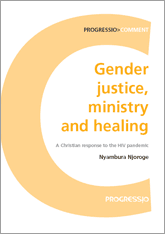 Short essays offering insights into development issues. Click on the titles to download PDF versions. They are listed in reverse chronological order by publication date.
Short essays offering insights into development issues. Click on the titles to download PDF versions. They are listed in reverse chronological order by publication date.
All downloads are free - but if you find our publications useful, please consider making a donation to our work - thank you!
Gender justice, ministry and healing: A Christian response to the HIV pandemic
Nyambura Njoroge (2009)
Theologian and ecumenist Nyambura Njoroge describes the experience of African Christian women in promoting gender justice, in the context of HIV, through a ‘ministry of Bible reading’. She highlights the potential of Christian communities to tackle the gender discrimination and disempowerment of women that has been a key driver of the HIV pandemic.
Stigma in the context of development: A Christian response to the HIV pandemic
Gillian Paterson (2009)
Theologian and writer Gillian Paterson considers the theological and ethical issues raised by the stigmatisation and discrimination of people with HIV.
Instability, structural violence and vulnerability: A Christian response to the HIV pandemic
James Keenan and Enda McDonagh (2009)
The authors argue that an effective response to HIV in the context of inequality and poverty must be based on a clear understanding of the interlocking concepts of instability, structural violence and vulnerability.
Unless the grain of wheat shall die: The moral and theological case against Terminator seeds
Sean McDonagh and Donal Dorr (2008)
Sean McDonagh and Donal Dorr argue that Terminator technology (the genetic modification of seeds so that they become sterile after the first planting) poses an unacceptable threat to poor and marginalised small-scale farmers and to the world’s environment, and is fundamentally wrong on moral and theological grounds.
Live simply: Let others live
Edward P Echlin (2007)
Edward Echlin argues that it is time for people in the global North to recognise the impact that our unsustainable lifestyles are having on people and poverty in the global South.
Food sovereignty: The people’s alternative
Ernest Cañada (2006)
Ernest Cañada outlines how small family farmers are opposing the dominant agribusiness model with an alternative approach based on the concept of food sovereignty.
A question of commitment
Marigold Best and Pamela Hussey (2006)
Marigold Best and Pamela Hussey argue that our commitment must be to what is life-giving and life-enhancing.
A culture of peace: Women, faith and reconciliation
Marigold Best and Pamela Hussey (2005)
Marigold Best and Pamela Hussey put forward the voices and perspectives of women from around the world who are making powerful and innovative contributions to peace-building.
West Papua: The struggle for peace with justice
Neles Tebay (2005)
Papuan priest Neles Tebay outlines the past and present injustices suffered by indigenous Papuans, and describes the peace-building work that offers the only real hope for the Papuan people that they will not forever have to live as outsiders in their own land.
Whatever happened to the post-apartheid moment? Past hopes and possible futures for southern Africa
Peter Vale (2005)
A decade on from the end of apartheid, hopes of peace and prosperity for southern Africa have been dashed. Peter Vale examines the dynamics that have shaped the region, and looks ahead to where southern Africa might go from here.
People and the environment on the edge: Environmental vulnerability in Latin America and the Caribbean
J Timmons Roberts and Bradley C Parks (2004)
This Comment examines the causes and consequences of environmental degradation in Latin America and the Caribbean, and argues that neoliberal structures of aid, trade, debt and investment have made poor people most vulnerable to the adverse consequences of the stresses that the modern world is placing on the environment.
Pueblos y medio ambiente en peligro: Vulnerabilidad ambiental en América Latina y el Caribe
J Timmons Roberts y Bradley C Parks (2004)
Spanish edition of People and the environment on the edge.
Inheriting the earth: Land reform in southern Africa
Lloyd M Sachikonye (2004)
Land reform in southern Africa has so far failed to address the deeply rooted social, economic and political inequalities that persist over the ownership of and access to the land. Lloyd Sachikonye argues that land reform must be incorporated within national development strategies that strive for poverty reduction and social justice.


